We Tested 3 Routific Competitors. Here's What We Found
Routific is missing essential route optimisation and delivery management features. We examine eLogii, Tookan, and OptimoRoute as Routific alternatives
Home > Blog > 3 Best Delivery Management Software UK Edition [Detailed Comparison]
ReviewsLooking for the best delivery management software available in the UK? Here’s are 3 of the best platforms, including eLogii, Optimoroute & LogiNext.
Looking for the best delivery management software available in the UK to help you organise, optimize and execute your delivery operations but aren’t sure how to choose the one that’s going to fit your particular needs the most?
Well then, you’ve come to the right spot, as we’ve done our research well and have come up with a list of as many as 4 best delivery management software UK edition for you to choose from.
We’ve prepared a detailed analysis of each platform’s features, pricing policies and ideal use case.
That way, you’ll have all the necessary information to make the right decision.
To get the best insight into these platforms’ functionality, we’ve used them for a whole month.
But we did more than that, as we’ve also made sure to:
And when it comes to the evaluation criteria, we looked for the essential features that the best delivery management software simply must include, such as:
Ideally, the best delivery management software will have all of the above features and come at an affordable price on top of that.
And not to mention that it should have just the right use case to fit your business’s type and size like a glove.
But, is there such a solution?
Let’s break down each platform’s features and use cases one by one to find out.
eLogii is a cloud-based route optimization and delivery management platform specifically designed to accommodate all the imperatives of contemporary last-mile delivery.
Its broad functionality and high flexibility make it suitable for businesses of all types and sizes.
It’s no wonder then that despite being a relatively new delivery management platform on the UK market, it’s already earned excellent ratings of 4.8 and 5.0 out of 5 on Capterra and G2, respectively.
When it comes to eLogii’s key delivery management & optimization features, it’s fair to say that this platform offers perhaps the widest range of various essential functionality compared to any other on the market, including:
![]()
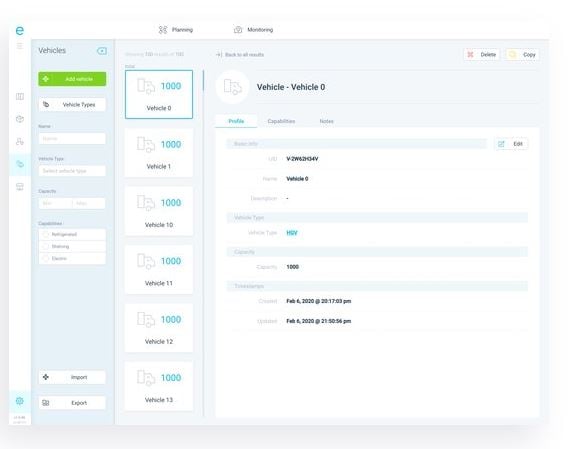
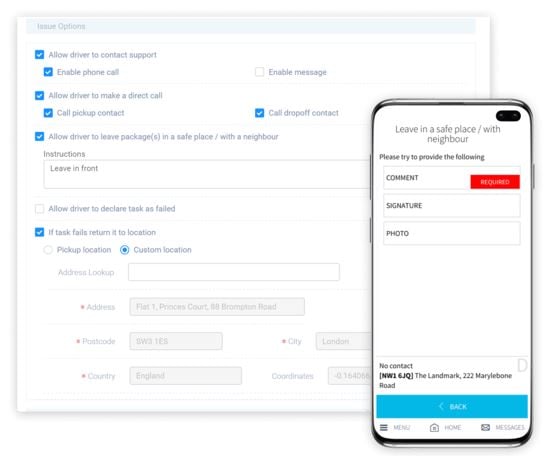
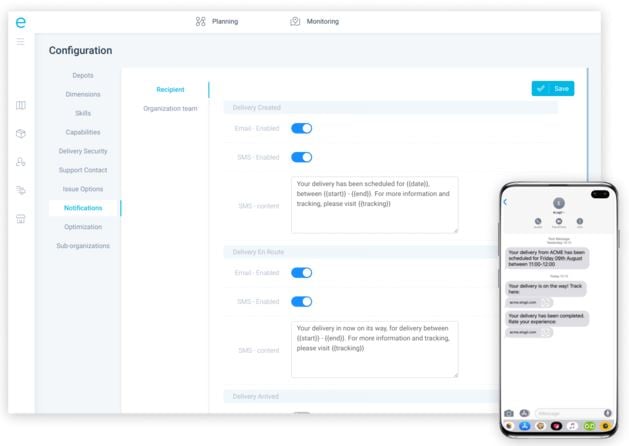
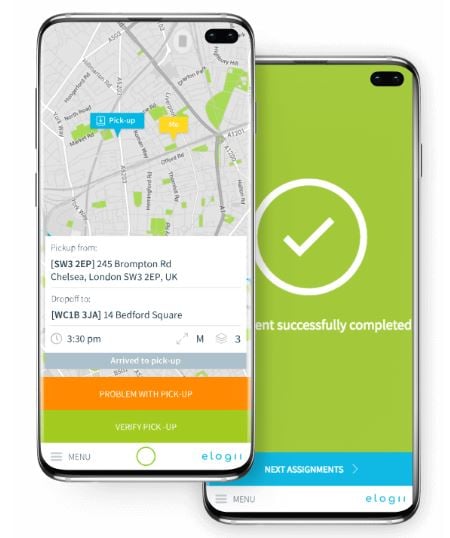
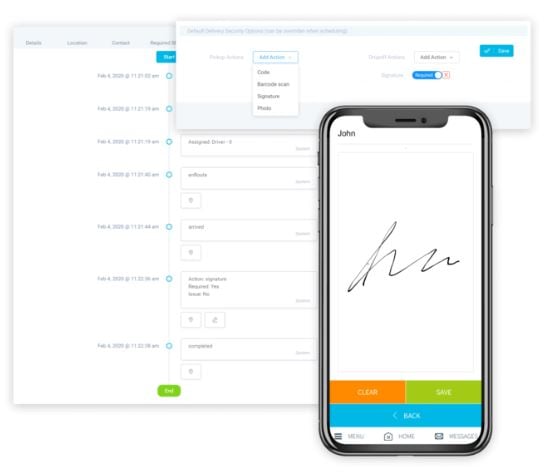

Given that it’s as flexible and scalable as it is, it doesn’t surprise that eLogii doesn’t have a one-size-fits-all pricing policy.
On the contrary, eLogii provides a custom price to each customer based on their specific needs after a free consultation with a product expert.

What we can say for sure is that:
eLogii’s pricing policy is one of the things that make it an ideal solution for medium and large businesses as well as businesses that aim to scale.
Namely, the per-task pricing means that the costs for these businesses won’t go through the roof as they grow their fleet - as is the case with platforms that charge users on a per-vehicle or per-driver basis.
eLogii is the ideal last-mile delivery software for businesses small and large alike - except for micro businesses that can’t reach the number of 2500 tasks per month and won’t need all its features.
In addition to ticking all of the best delivery management boxes we’ve mentioned above, eLogii also:
Although OptimoRoute is first and foremost a route optimization tool, as its name would suggest, it does have plenty of features that could give a hand with delivery management in general.
In addition, OptimoRoute has a pretty good rating on the main review sites: 4.5 out of 5 on Capterra and 4.8 on G2, resulting in an average of 4.65.
OptimoRoute has a decent range of functionality, especially when it comes to route optimization, such as:

When it comes to other features, they include some options for customising various delivery needs like:
Some other capabilities worth noting are:
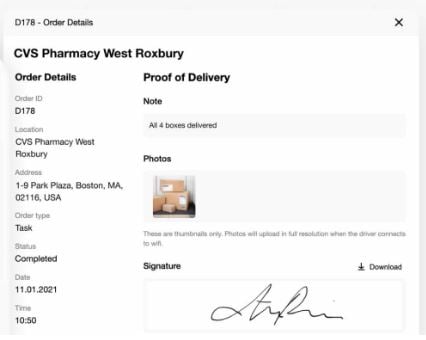
However, OptimoRoute does have several shortcomings:
OptimoRoute’s pricing policy is significantly different to eLogii’s.
Namely, they have fixed pricing plans that don’t consider a business’s specific requirements and characteristics, and they charge users on a per-driver basis.
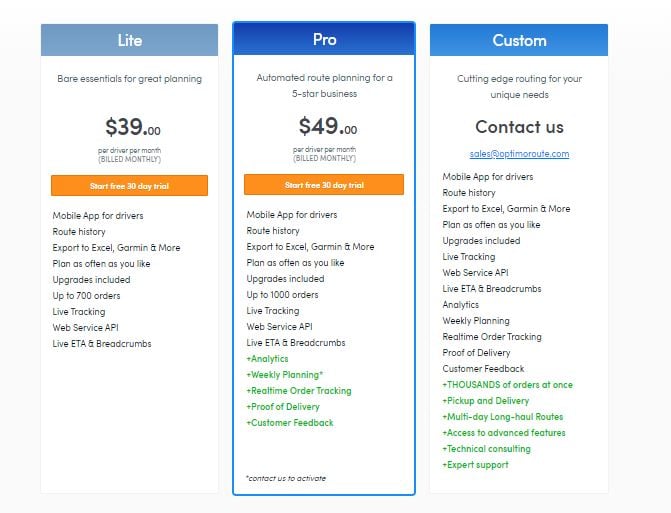
What’s more, if you need more advanced features (e.g. POD collection, real-time order tracking, customer feedback, etc.), you’ll have to opt for the Pro plan at $49 (£40) per driver per month when billed monthly.
Given that OptimoRoute is priced on a per-driver basis, your costs will stack up real high real fast if you have a slightly larger fleet or are planning on expanding it.
And not to mention that there’s a cap on the number of orders (a pickup or a delivery) that can be planned and stored at once - which will be a significant obstacle for bigger businesses, as the limit is set at just 1,000.
So, if you manage a fleet of about 20 vehicles, expect to pay as much as $980 (£802) in just one month and for a meagre 1000 orders at that.
OptimoRoute’s sheer number of features makes it one of the more advanced solutions available in the UK market.
However, its per-driver pricing policy, a very limited number of tasks per package and the lack of some core functionality (e.g. barcode scanning, advanced failed delivery workflows, dynamic routing, etc.) make it a viable option only for the smallest businesses.
LogiNext is a delivery management platform that offers several logistics solutions in its suit. This gives LogiNext a few extra capabilities compared to the stand-alone alternatives and makes it a good choice for businesses that need such features.
It has a pretty good user rating of 4.3 on Capterra and 4.6 on G2, which gives an average score of 4.5.
LogiNext’s most notable features are:

However, one of LogiNext’s most significant downsides - besides its price, which we’ll delve into soon - is the lack of customisation options regarding various operational and optimization parameters.
For example, LogiNext doesn’t enable users to automatically optimize vehicle load, i.e., match a certain order with just the right vehicle for accommodating it or ensure that the vehicle is being used at its optimal potential.
You’ll have to do all this manually, which can get quite time-consuming when you deal with lots of different vehicles or large-capacity vehicles such as trucks.
The price is definitely one of LogiNext’s biggest shortcomings - not only because it’s a pretty expensive solution but also because its pricing policy, as disclosed on their website, is quite confusing.

There are a few problems with LogiNext’s pricing.
Firstly, their pricing page says it comes at $49 (£40) per month per resource for the Advanced package - a resource being one vehicle or driver. That would mean that the price per vehicle is basically the same as with OptimoRoute, at first glance.
However, there’s a special catch with LogiNext. As shown above, the smallest paid-for plan available is 25 resources per month - giving an entry price of $1,225 (£1,003) per month.
But it doesn’t end there.
If you pay attention to the tiny-lettered disclaimer underneath, you’ll see that there is a “web license cost” that’s not included in that price.
That means the actual entry-level price is $1,225 (£1,003) per month, plus whatever a web license costs.
However, further down on the pricing page, it says you can have as few as 5 resources on a plan.
And to make matters even more baffling, LogiNext gives different names to the three packages in the very next table (Basic, Premium, and Advanced; presumably corresponding to Free, Advanced (!), and Enterprise).
Confused? Yeah, so are we.
LogiNext Mile has many versatile features, with just a few omissions (e.g. vehicle load optimization), making it one of the most powerful last-mile delivery software tools available on the UK market.
But it comes with a price tag to match, putting it out of reach for most smaller businesses.
So, although its per-driver or per-vehicle pricing would intuitively make it a good choice for small businesses, LogiNext is actually an utterly unsustainable solution for all but enterprises with significant budgets and high logistics demands.
Each platform we reviewed is first-class in its range and has a lot to offer to prospective users.
However, not all solutions are made equal and with the same type of user in mind.
So, what businesses should use which delivery management software? Here are our final takeaways to keep in mind when deciding:
Routific is missing essential route optimisation and delivery management features. We examine eLogii, Tookan, and OptimoRoute as Routific alternatives
Looking for GSMtasks alternatives that can suit your needs? This guide gives you all the answers you need.
Tookan has its uses as routing software, but it won’t work for everyone. We examine eLogii, GetSwift, RoadWarrior & Onfleet as the best Tookan...
Be the first to know when new articles are released. eLogii has a market-leading blog and resources centre designed specifically to help business across countless distribution and field-services sub sectors worldwide to succeed with actionable content and tips.
